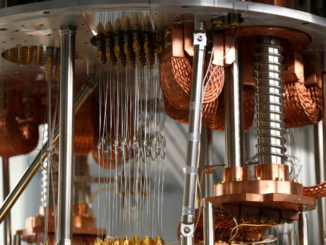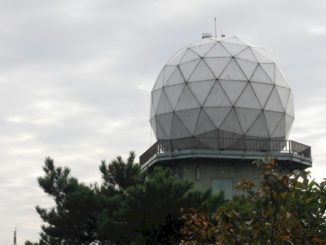
The Forschungszentrum Jülich Supercomputing Center (JSC) in Germany will soon be home to Europe’s first D-Wave quantum computer. By the end of 2020, the center plans to deploy D-Wave’s upcoming Advantage quantum annealing system and make it available to European businesses and research organizations through the company’s Leap quantum cloud service.
As we reported in September, the Advantage machine will be equipped with over 5,000 qubits, which is more than double the number in the D-Wave’s current 2000Q quantum annealer. The enhanced design features the new Pegasus topology, which provides a much higher level of qubit connectivity. Those two enhancements, as well as a number of others, will make Advantage D-Wave’s most powerful system to date when it becomes available in mid-2020.
Due to the cost of D-Wave systems – estimated to be somewhere between $10 to $20 million – and the exacting operating environment that must be provided for them, many, if not most users are accessing D-Wave hardware through the Leap cloud service. Leap was introduced in 2018 and is currently hooked up to 2000Q hardware.
To date, all D-Wave deployments have been in North America. The rationale for putting one in Europe is to provide EU businesses, universities, and research centers more intimate access to the hardware. According to Prof. Kristel Michielsen, who leads Quantum Information Processing group at Forschungszentrum Jülich, having the machine at the center will make it more practical to pair the Advantage system with JSC supercomputers. The idea is to be able to run applications in “hybrid mode,” where the D-Wave machine is used to run the quantum algorithms, with the HPC systems used for the wrapper and other software components that rely on digital hardware.
Local control will also make it possible to operate the system according to the stringent regulations the EU has established for things like data privacy and sovereignty. Michielsen told us this is particularly relevant to potential industry customers interested in using the Advantage machine for commercial purposes in Europe.
She expects the upcoming system will be of interest to an array of businesses there, including chemical companies, automotive suppliers, and aerospace firms. Airbus, specifically, has been interested in using quantum computers to perform fault tree analysis (FTA) on its aircraft and spacecraft designs in order to learn more about the behavior of system failures. (Airbus already has some experience in this area using D-Wave’s 2000Q machine.) Vehicle companies can apply FTA to their designs as well but are also interested in quantum computing for applications like autonomous driving, traffic control, and battery development.
The Advantage system will be housed in a new facility to be constructed under the recently announced the Jülich UNified Infrastructure for Quantum (JUNIQ) initiative. JUNIQ (pronounced “unique) is being established with €10 million in funding, split between the North Rhine-Westphalian state government and the Federal Ministry of Education and Research. Michielsen, who is one of the cofounders of JUNIQ, said the new facility will be in a separate building from where the JSC supercomputers are housed and will require special construction in order to minimize vibration for the sensitive quantum computing hardware.
Initially, the JUNIQ facility will house only the D-Wave Advantage system, but according to Michielsen, there is a spot for another machine as well. Although they have not committed to what it might be used for, Michielsen did tell us they are interested in getting access to IBM Q machines as well as Google’s quantum computing hardware. Whether that means they will eventually be installing such systems on premise or accessing them remotely via the cloud is still up in the air. For what it’s worth, Fraunhofer-Gesellschaft has partnered with IBM to install a Q System One in Germany, so
In a separate facility, Forschungszentrum Jülich is planning to install an EU-funded quantum computer, known as OpenSuperQ, which stands for Open Superconducting Quantum Computer. The goal of the three-year, €10.33 million project, which began in October 2018, is to develop an experimental quantum computer of 50 to 100 qubits, along with a complete software stack. OpenSuperQ is being developed under the Quantum Flagship, a 10-year, €1 billion European initiative to develop domestic quantum computing capabilities on the continent.
JUNIQ will also be offering quantum computing simulators, including Jülich’s in-house platform, which last year simulated a 48-qubit system on conventional HPC hardware. In addition, the project will provide access to the Atos’s quantum computing simulator, the Quantum Learning Machine, an appliance that provides simulation of 30 to 40 qubits on custom hardware.
Putting a quantum computer on European soil and integrating it with other HPC machinery is part of a larger strategy in the EU targeting modular supercomputing. Much of the initial implementation of that strategy is being carried out at JSC, starting with the JUWELS supercomputer. That idea is to provide a system of modular components: a more conventional cluster for scale-out parallelism, an accelerated machine for scale-up, and an analytics system for big data workloads. In addition to those von Neumann components, will be quantum computing and a neuromorphic computing modules. The D-Wave system at JSC represents the first machine to check that quantum computing box.
How the Leap cloud service for the Advantage system fits in with the HPC allocation model at Jülich still needs to be worked out said Michielsen. For researchers at universities and other centers, it will most likely follow the peer review process for granting HPC resources at the supercomputing center. Companies may be able to take advantage of free access as well if they agree to collaborate with Jülich on their work and publish any resulting research. If businesses want to used Advantage for proprietary purpose, they will probably end up paying for the privilege, either to D-Wave, JSC, or both. As if yet, however, none of this is written in stone. Given the plan to deploy in late 2020, they still have more than a year to develop the business model and allocation rules for the system. “We are in an early stage,” explained Michielsen.





Be the first to comment